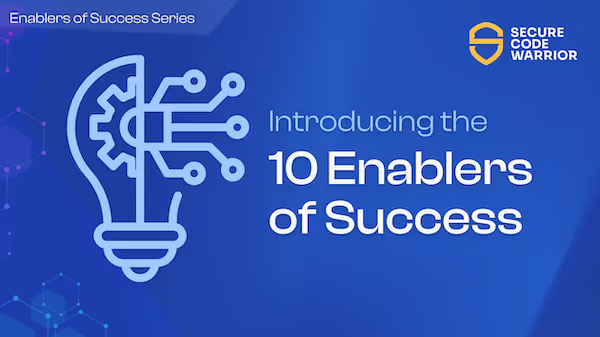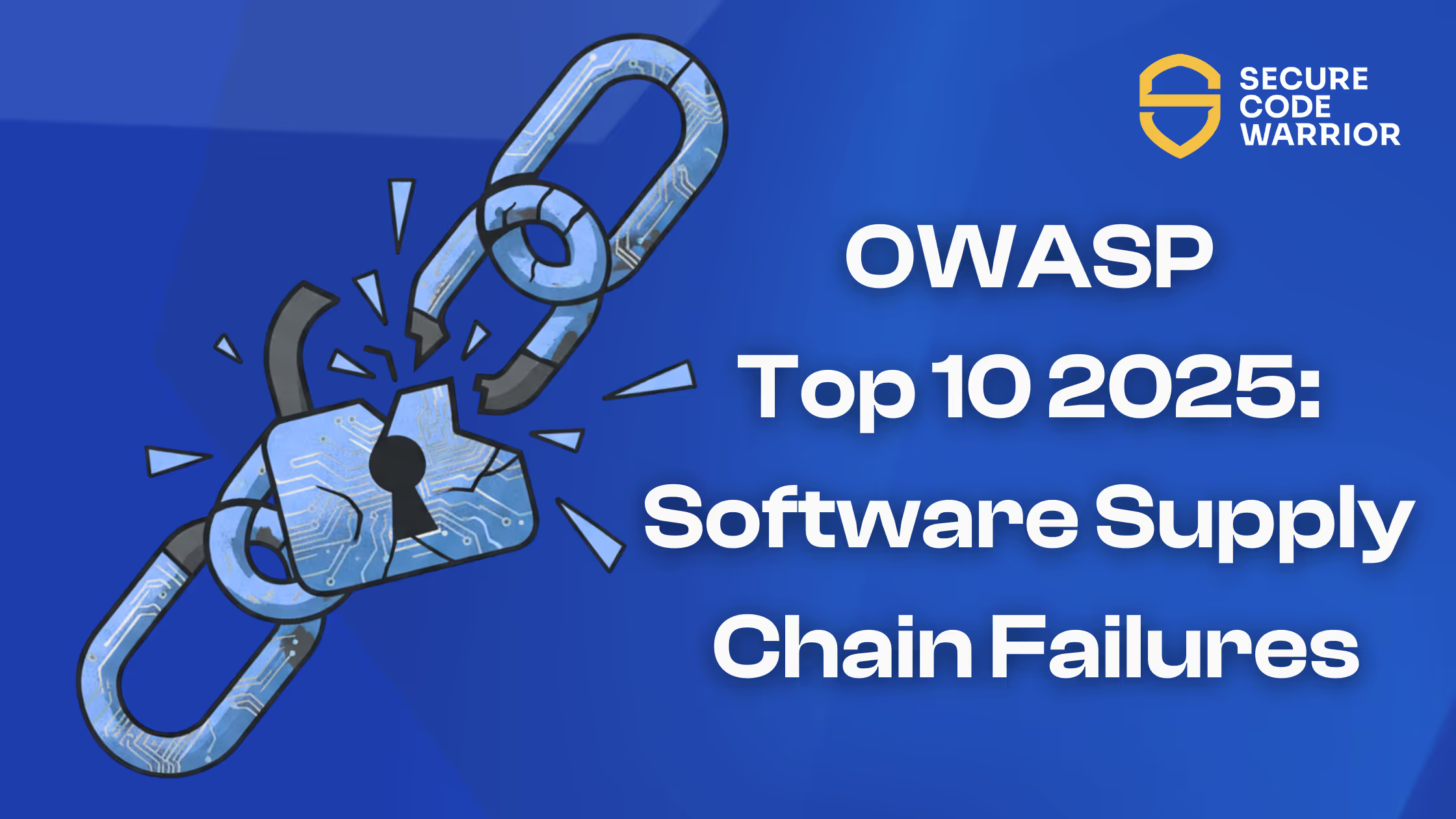
What keeps development teams up at night when it comes to secure coding?
Insecure code costs companies millions – so what gets in the way of adopting secure coding practices?
In a world that relies on software for just about everything, ensuring that code is secure is critical. Brand reputations and financial viability depend on it. That said, there are many concerns around secure coding – and many barriers to its full and effective adoption. More than ever before, a new way of working is required. So in 2020, Secure Code Warrior engaged with Evans Data Corp. to conduct primary research* into developers' and their managers’ attitudes towards secure coding, secure code practices, and security operations (download whitepaper here).
Right now, organizations find it hard to implement secure code practices. Developers and managers alike find dealing with vulnerabilities and being accountable for code particularly concerning.
Clearly, there is a need for better training and a program that supports secure code practices. This need becomes evident when we ask developers and their managers about their concerns around secure coding. Our research* showed that both these groups share the same basic set of concerns. But due to their different roles, they differ on which of these concerns are most pressing.
The number one concern for developers is ‘including code that replicates previous vulnerabilities’. As developers are judged on the quality of their code, this is hardly surprising. No developer wants to be the source of insecure code – or code that requires rework and slows down their team.
The second most significant concern for developers is dealing with mistakes introduced by coworkers. Meeting deadlines and being accountable for code are also high on the list – as is the fact that learning about secure code is challenging, which once again echoes the need for a new approach to secure code training.
Managers, on the other hand, take more of a top-down view.
As team managers and leaders, their number one concern is being accountable for code. If a team produces lousy code, the buck stops with its manager.
Code that replicates previous vulnerabilities comes in second. The fact that the learning process is challenging comes in third. As current secure code training approaches are not delivering, managers realize that a new approach is needed.
Barriers to adopting secure coding practices
When we asked managers about the barriers to adopting secure coding practices in their organizations, two things stand out loud and clear: communication and training.
45% identified a lack of communication between stakeholders and management as a significant roadblock. 42% bemoan the lack of secure coding skills among new hires. At the same time, 40% nominated inadequate training time and resources.
There are process and HR-related barriers to adopting secure code practices successfully throughout organizations.
But you can still make progress despite such intractable issues. The lack of secure coding skills among new hires and inadequate training and resources are easier to address.
Developers are on the front lines of battle when it comes to stopping vulnerabilities. But are they receiving the support, tools, and training to hold up their part of the security deal?
Based on their concerns, the short answer is 'no'.
The truth is, the right training shouldn't feel like a lecture.
As champions of change in secure coding, Secure Code Warrior takes a human-led approach that actively engages developers to learn and build their secure coding skills. Our proven Learning Platform provides development and security teams with contextual and hyper-relevant learning within their preferred workflow. It empowers them not just to find vulnerabilities but to prevent them from occurring in the first place.
This kind of hands-on training is an upskilling opportunity – a career move that only has positives for developers who are serious about stopping vulnerabilities and working with the rest of the team to produce a higher standard of code.
If you'd like to learn more – and see the potential impact on your teams' ability to 'start left' and ship secure code faster without compromising security, book a demo now.
*Shifting from reaction to prevention: The changing face of application security. Secure Code Warrior and Evans Data Corp. 2020

.avif)
Insecure code costs companies millions – so what gets in the way of adopting secure coding practices? In a world that relies on software for just about everything, ensuring that code is secure is critical. Brand reputations and financial viability depend on it. That said, there are many concerns around secure coding – and many barriers to its full and effective adoption. More than ever before, a new way of working is required.
Secure Code Warrior makes secure coding a positive and engaging experience for developers as they increase their skills. We guide each coder along their own preferred learning pathway, so that security-skilled developers become the everyday superheroes of our connected world.

Secure Code Warrior is here for your organization to help you secure code across the entire software development lifecycle and create a culture in which cybersecurity is top of mind. Whether you’re an AppSec Manager, Developer, CISO, or anyone involved in security, we can help your organization reduce risks associated with insecure code.
Book a demoSecure Code Warrior makes secure coding a positive and engaging experience for developers as they increase their skills. We guide each coder along their own preferred learning pathway, so that security-skilled developers become the everyday superheroes of our connected world.
This article was written by Secure Code Warrior's team of industry experts, committed to empowering developers with the knowledge and skills to build secure software from the start. Drawing on deep expertise in secure coding practices, industry trends, and real-world insights.

.avif)
Insecure code costs companies millions – so what gets in the way of adopting secure coding practices?
In a world that relies on software for just about everything, ensuring that code is secure is critical. Brand reputations and financial viability depend on it. That said, there are many concerns around secure coding – and many barriers to its full and effective adoption. More than ever before, a new way of working is required. So in 2020, Secure Code Warrior engaged with Evans Data Corp. to conduct primary research* into developers' and their managers’ attitudes towards secure coding, secure code practices, and security operations (download whitepaper here).
Right now, organizations find it hard to implement secure code practices. Developers and managers alike find dealing with vulnerabilities and being accountable for code particularly concerning.
Clearly, there is a need for better training and a program that supports secure code practices. This need becomes evident when we ask developers and their managers about their concerns around secure coding. Our research* showed that both these groups share the same basic set of concerns. But due to their different roles, they differ on which of these concerns are most pressing.
The number one concern for developers is ‘including code that replicates previous vulnerabilities’. As developers are judged on the quality of their code, this is hardly surprising. No developer wants to be the source of insecure code – or code that requires rework and slows down their team.
The second most significant concern for developers is dealing with mistakes introduced by coworkers. Meeting deadlines and being accountable for code are also high on the list – as is the fact that learning about secure code is challenging, which once again echoes the need for a new approach to secure code training.
Managers, on the other hand, take more of a top-down view.
As team managers and leaders, their number one concern is being accountable for code. If a team produces lousy code, the buck stops with its manager.
Code that replicates previous vulnerabilities comes in second. The fact that the learning process is challenging comes in third. As current secure code training approaches are not delivering, managers realize that a new approach is needed.
Barriers to adopting secure coding practices
When we asked managers about the barriers to adopting secure coding practices in their organizations, two things stand out loud and clear: communication and training.
45% identified a lack of communication between stakeholders and management as a significant roadblock. 42% bemoan the lack of secure coding skills among new hires. At the same time, 40% nominated inadequate training time and resources.
There are process and HR-related barriers to adopting secure code practices successfully throughout organizations.
But you can still make progress despite such intractable issues. The lack of secure coding skills among new hires and inadequate training and resources are easier to address.
Developers are on the front lines of battle when it comes to stopping vulnerabilities. But are they receiving the support, tools, and training to hold up their part of the security deal?
Based on their concerns, the short answer is 'no'.
The truth is, the right training shouldn't feel like a lecture.
As champions of change in secure coding, Secure Code Warrior takes a human-led approach that actively engages developers to learn and build their secure coding skills. Our proven Learning Platform provides development and security teams with contextual and hyper-relevant learning within their preferred workflow. It empowers them not just to find vulnerabilities but to prevent them from occurring in the first place.
This kind of hands-on training is an upskilling opportunity – a career move that only has positives for developers who are serious about stopping vulnerabilities and working with the rest of the team to produce a higher standard of code.
If you'd like to learn more – and see the potential impact on your teams' ability to 'start left' and ship secure code faster without compromising security, book a demo now.
*Shifting from reaction to prevention: The changing face of application security. Secure Code Warrior and Evans Data Corp. 2020

Insecure code costs companies millions – so what gets in the way of adopting secure coding practices?
In a world that relies on software for just about everything, ensuring that code is secure is critical. Brand reputations and financial viability depend on it. That said, there are many concerns around secure coding – and many barriers to its full and effective adoption. More than ever before, a new way of working is required. So in 2020, Secure Code Warrior engaged with Evans Data Corp. to conduct primary research* into developers' and their managers’ attitudes towards secure coding, secure code practices, and security operations (download whitepaper here).
Right now, organizations find it hard to implement secure code practices. Developers and managers alike find dealing with vulnerabilities and being accountable for code particularly concerning.
Clearly, there is a need for better training and a program that supports secure code practices. This need becomes evident when we ask developers and their managers about their concerns around secure coding. Our research* showed that both these groups share the same basic set of concerns. But due to their different roles, they differ on which of these concerns are most pressing.
The number one concern for developers is ‘including code that replicates previous vulnerabilities’. As developers are judged on the quality of their code, this is hardly surprising. No developer wants to be the source of insecure code – or code that requires rework and slows down their team.
The second most significant concern for developers is dealing with mistakes introduced by coworkers. Meeting deadlines and being accountable for code are also high on the list – as is the fact that learning about secure code is challenging, which once again echoes the need for a new approach to secure code training.
Managers, on the other hand, take more of a top-down view.
As team managers and leaders, their number one concern is being accountable for code. If a team produces lousy code, the buck stops with its manager.
Code that replicates previous vulnerabilities comes in second. The fact that the learning process is challenging comes in third. As current secure code training approaches are not delivering, managers realize that a new approach is needed.
Barriers to adopting secure coding practices
When we asked managers about the barriers to adopting secure coding practices in their organizations, two things stand out loud and clear: communication and training.
45% identified a lack of communication between stakeholders and management as a significant roadblock. 42% bemoan the lack of secure coding skills among new hires. At the same time, 40% nominated inadequate training time and resources.
There are process and HR-related barriers to adopting secure code practices successfully throughout organizations.
But you can still make progress despite such intractable issues. The lack of secure coding skills among new hires and inadequate training and resources are easier to address.
Developers are on the front lines of battle when it comes to stopping vulnerabilities. But are they receiving the support, tools, and training to hold up their part of the security deal?
Based on their concerns, the short answer is 'no'.
The truth is, the right training shouldn't feel like a lecture.
As champions of change in secure coding, Secure Code Warrior takes a human-led approach that actively engages developers to learn and build their secure coding skills. Our proven Learning Platform provides development and security teams with contextual and hyper-relevant learning within their preferred workflow. It empowers them not just to find vulnerabilities but to prevent them from occurring in the first place.
This kind of hands-on training is an upskilling opportunity – a career move that only has positives for developers who are serious about stopping vulnerabilities and working with the rest of the team to produce a higher standard of code.
If you'd like to learn more – and see the potential impact on your teams' ability to 'start left' and ship secure code faster without compromising security, book a demo now.
*Shifting from reaction to prevention: The changing face of application security. Secure Code Warrior and Evans Data Corp. 2020

Click on the link below and download the PDF of this resource.
Secure Code Warrior is here for your organization to help you secure code across the entire software development lifecycle and create a culture in which cybersecurity is top of mind. Whether you’re an AppSec Manager, Developer, CISO, or anyone involved in security, we can help your organization reduce risks associated with insecure code.
View reportBook a demoSecure Code Warrior makes secure coding a positive and engaging experience for developers as they increase their skills. We guide each coder along their own preferred learning pathway, so that security-skilled developers become the everyday superheroes of our connected world.
This article was written by Secure Code Warrior's team of industry experts, committed to empowering developers with the knowledge and skills to build secure software from the start. Drawing on deep expertise in secure coding practices, industry trends, and real-world insights.
Insecure code costs companies millions – so what gets in the way of adopting secure coding practices?
In a world that relies on software for just about everything, ensuring that code is secure is critical. Brand reputations and financial viability depend on it. That said, there are many concerns around secure coding – and many barriers to its full and effective adoption. More than ever before, a new way of working is required. So in 2020, Secure Code Warrior engaged with Evans Data Corp. to conduct primary research* into developers' and their managers’ attitudes towards secure coding, secure code practices, and security operations (download whitepaper here).
Right now, organizations find it hard to implement secure code practices. Developers and managers alike find dealing with vulnerabilities and being accountable for code particularly concerning.
Clearly, there is a need for better training and a program that supports secure code practices. This need becomes evident when we ask developers and their managers about their concerns around secure coding. Our research* showed that both these groups share the same basic set of concerns. But due to their different roles, they differ on which of these concerns are most pressing.
The number one concern for developers is ‘including code that replicates previous vulnerabilities’. As developers are judged on the quality of their code, this is hardly surprising. No developer wants to be the source of insecure code – or code that requires rework and slows down their team.
The second most significant concern for developers is dealing with mistakes introduced by coworkers. Meeting deadlines and being accountable for code are also high on the list – as is the fact that learning about secure code is challenging, which once again echoes the need for a new approach to secure code training.
Managers, on the other hand, take more of a top-down view.
As team managers and leaders, their number one concern is being accountable for code. If a team produces lousy code, the buck stops with its manager.
Code that replicates previous vulnerabilities comes in second. The fact that the learning process is challenging comes in third. As current secure code training approaches are not delivering, managers realize that a new approach is needed.
Barriers to adopting secure coding practices
When we asked managers about the barriers to adopting secure coding practices in their organizations, two things stand out loud and clear: communication and training.
45% identified a lack of communication between stakeholders and management as a significant roadblock. 42% bemoan the lack of secure coding skills among new hires. At the same time, 40% nominated inadequate training time and resources.
There are process and HR-related barriers to adopting secure code practices successfully throughout organizations.
But you can still make progress despite such intractable issues. The lack of secure coding skills among new hires and inadequate training and resources are easier to address.
Developers are on the front lines of battle when it comes to stopping vulnerabilities. But are they receiving the support, tools, and training to hold up their part of the security deal?
Based on their concerns, the short answer is 'no'.
The truth is, the right training shouldn't feel like a lecture.
As champions of change in secure coding, Secure Code Warrior takes a human-led approach that actively engages developers to learn and build their secure coding skills. Our proven Learning Platform provides development and security teams with contextual and hyper-relevant learning within their preferred workflow. It empowers them not just to find vulnerabilities but to prevent them from occurring in the first place.
This kind of hands-on training is an upskilling opportunity – a career move that only has positives for developers who are serious about stopping vulnerabilities and working with the rest of the team to produce a higher standard of code.
If you'd like to learn more – and see the potential impact on your teams' ability to 'start left' and ship secure code faster without compromising security, book a demo now.
*Shifting from reaction to prevention: The changing face of application security. Secure Code Warrior and Evans Data Corp. 2020
Table of contents
Secure Code Warrior makes secure coding a positive and engaging experience for developers as they increase their skills. We guide each coder along their own preferred learning pathway, so that security-skilled developers become the everyday superheroes of our connected world.

Secure Code Warrior is here for your organization to help you secure code across the entire software development lifecycle and create a culture in which cybersecurity is top of mind. Whether you’re an AppSec Manager, Developer, CISO, or anyone involved in security, we can help your organization reduce risks associated with insecure code.
Book a demoDownloadResources to get you started
Cyber Resilience Act (CRA) Aligned Learning Pathways
SCW supports Cyber Resilience Act (CRA) readiness with CRA-aligned Quests and conceptual learning collections that help development teams build the Secure by Design, SDLC, and secure coding skills aligned with the CRA’s secure development principles.
Threat Modeling with AI: Turning Every Developer into a Threat Modeler
Walk away better equipped to help developers combine threat modeling ideas and techniques with the AI tools they're already using to strengthen security, improve collaboration, and build more resilient software from the start.












%20(1).avif)
.avif)


.avif)

